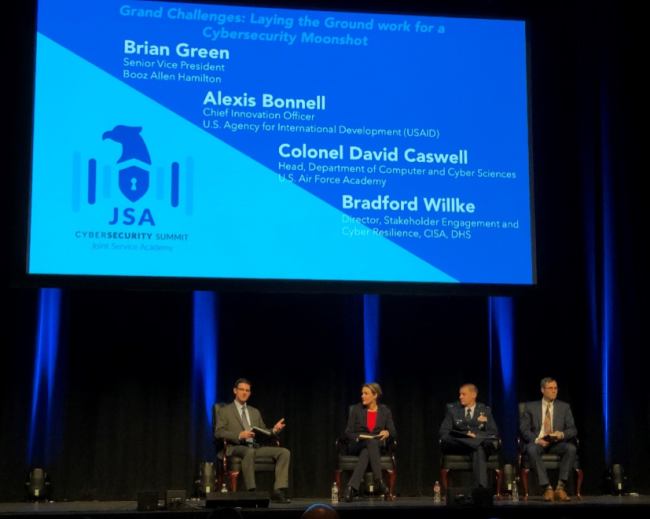Cybersecurity Grand Challenges – Setting the Stage for a Secure Future
Booz Allen empowers others to take a future-forward approach to change the world, especially in critical areas of the government and industry such as cybersecurity. That’s why Booz Allen didn’t pass on the opportunity to invest in a process to “make the Internet safe and secure for the functioning of Government and critical services for the American people by 2028,” as outlined in the National Security Telecommunications Advisory Committee (NSTAC)’s Report to the President on a Cybersecurity Moonshot.
“Our experts serve at the cyber frontlines to support our clients’ missions,” says Executive Vice President Brad Medairy, Booz Allen’s cyber functional service officer. “Supporting the Cybersecurity Moonshot initiative is an extension of our commitment to security and an important step in setting the stage for how we collectively address the growing threat landscape.”
In coordination with the Joint Services Academy, Booz Allen sponsored workshops in February and April 2019, with the collective ingenuity of the cybersecurity community. The workshops, which included experts from industry, government, and academia, focused on identifying, scoping and setting a path forward regarding the “Grand Challenges” that are anticipated to impact cybersecurity over the next 10 years. Insights from these working sessions served as a precursor to the Joint Services Academy Cybersecurity Summit, held at the US Air Force Academy in Colorado, April 17-18, 2019.
Booz Allen Senior VP and US Air Force Academy graduate, Brian Green, a leader in the Firm’s cyber and intelligence markets, facilitated the Summit’s panel, Grand Challenges: Laying the Groundwork for a Cybersecurity Moonshot. The panel was comprised of distinguished colleagues, Alexis Bonnell, Chief Innovation Officer at the US Agency for International Development (USAID); Colonel David Caswell, Head, Department of Computer and Cyber Science, US Air Force Academy; and Bradford Willke, Director, Stakeholder Engagement and Cyber Resilience, Cybersecurity and Infrastructure Security Agency (CISA), Department of Homeland Security (DHS).
The panelists discussed how the Grand Challenges methodology – of audacious thinking and outcome-based incentivized and crowdsourced solutions – could effectively work in addressing cybersecurity. Successfully leveraged to solve entrenched-challenges in industries such as space, energy and public health, the panel also emphasized that the grand challenges put forth for consideration must be short, “snackable” problems that a national audience can get behind and help solve.
“Looking 10 years ahead, it is critical that we mobilize the creativity and innovation of our Nation to begin addressing the cybersecurity challenges of the future,” says Green, emphasizing that the threat landscape continues to expand with new vulnerabilities and avenues for attack as technologies such as artificial intelligence and 5G communications become increasingly integrated into daily life.
“We must work together to close the cyber literacy gap, protect privacy, and establish new technologies, policies, and behavior patterns to make meaningful progress towards a more enduringly safe and secure Internet,” continued Green. “Fifty years ago, Booz Allen supported our Nation’s first Moonshot, and again we stand ready to play a critical role for our clients and our country as we move forward with the first set of cybersecurity grand challenges.”













